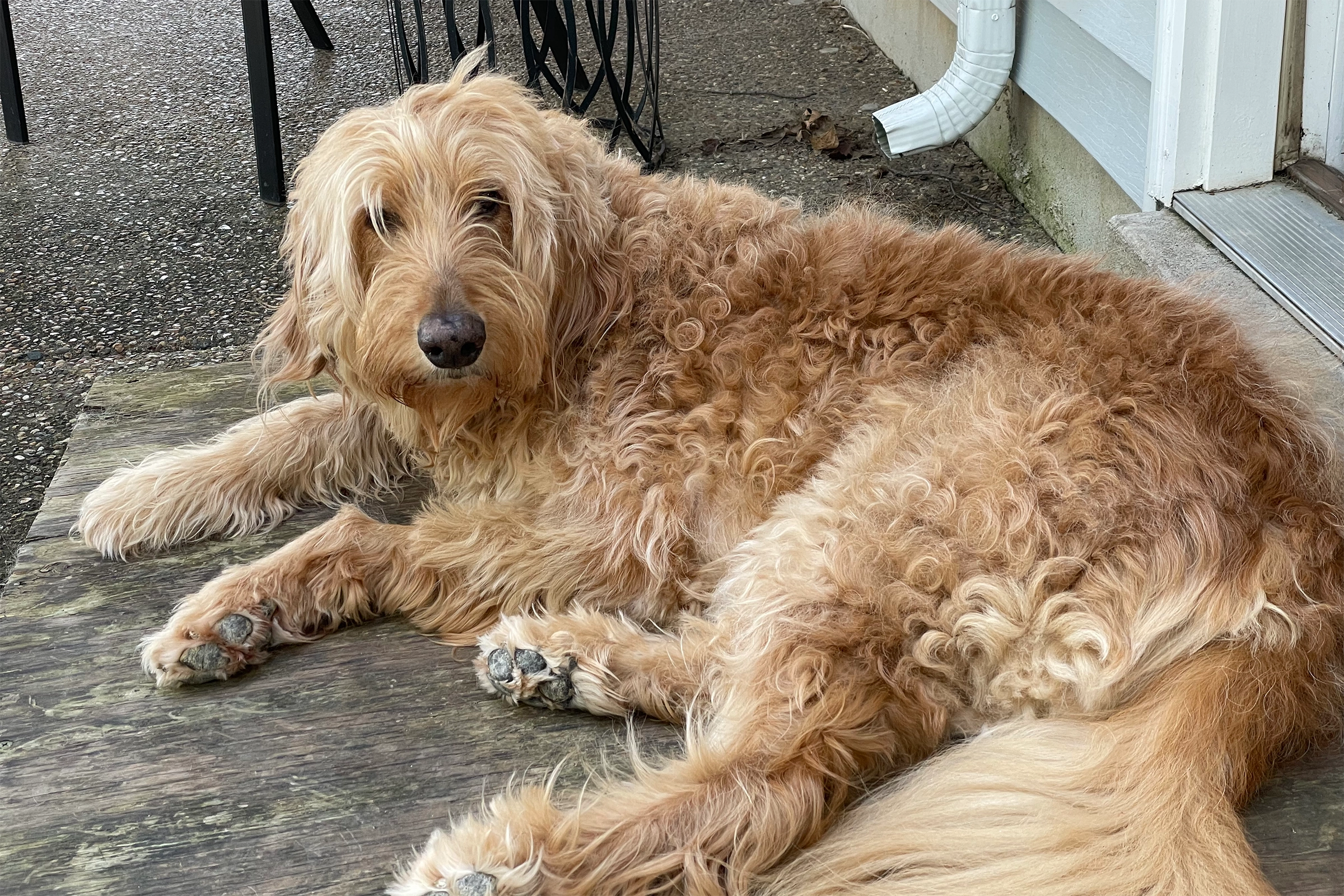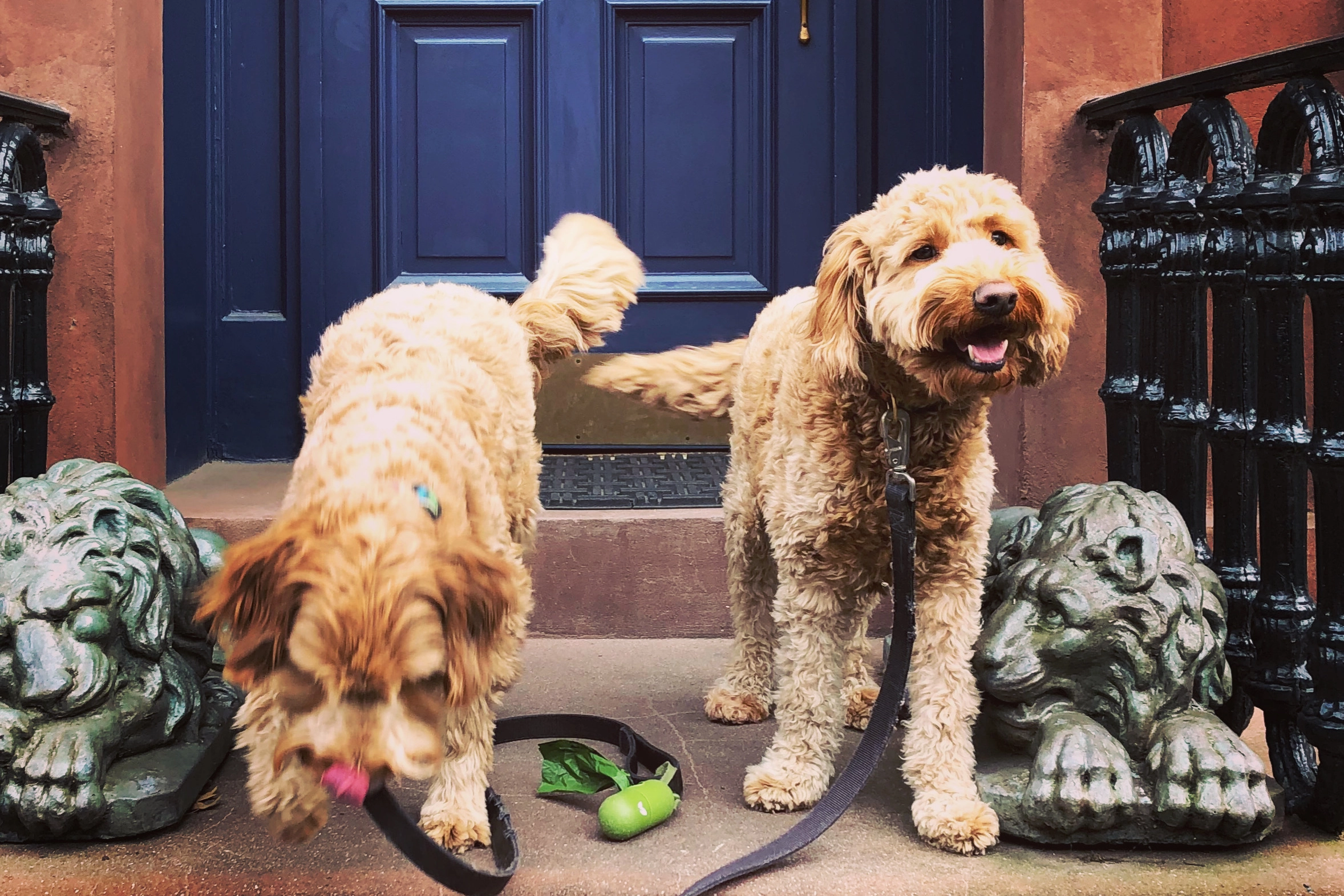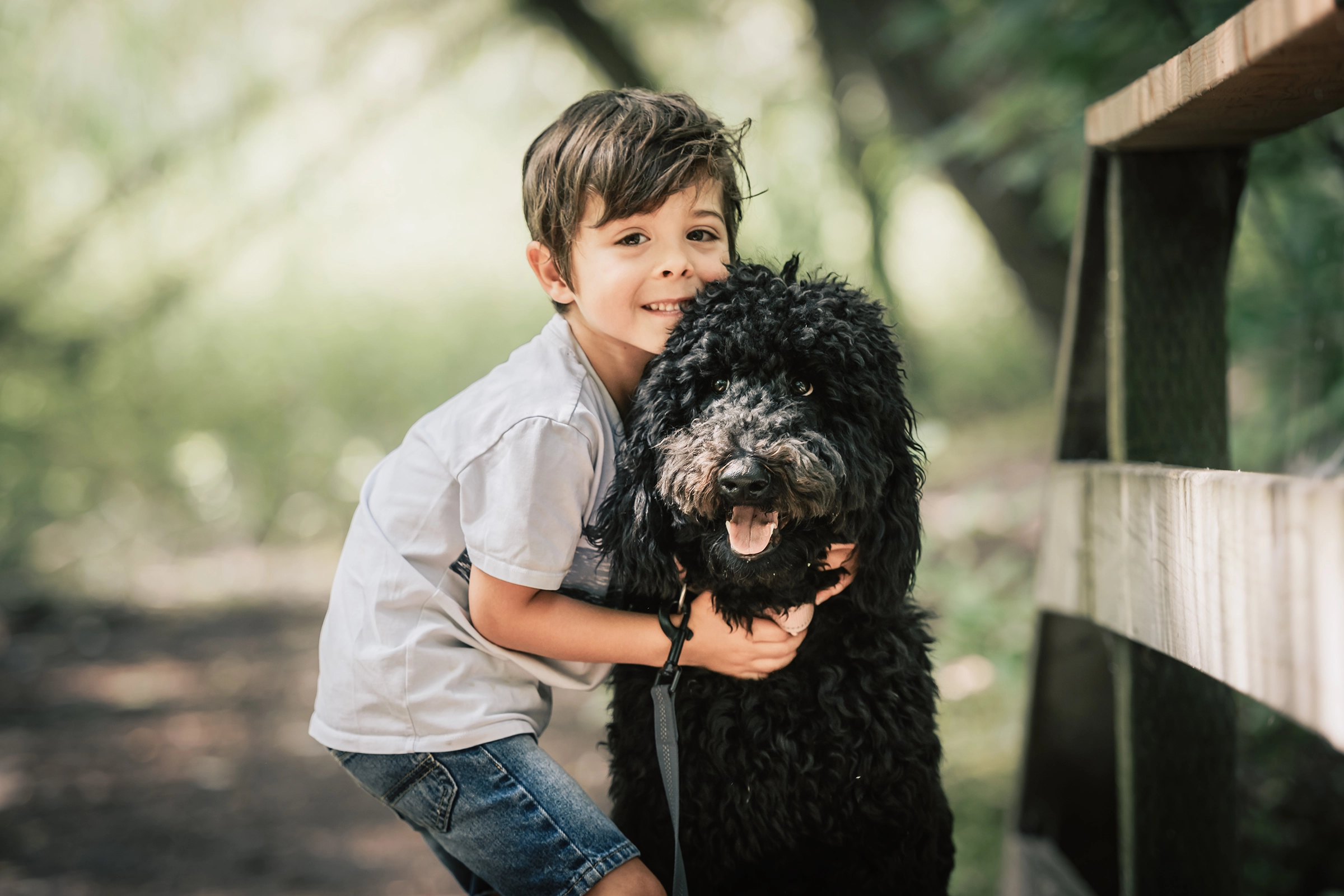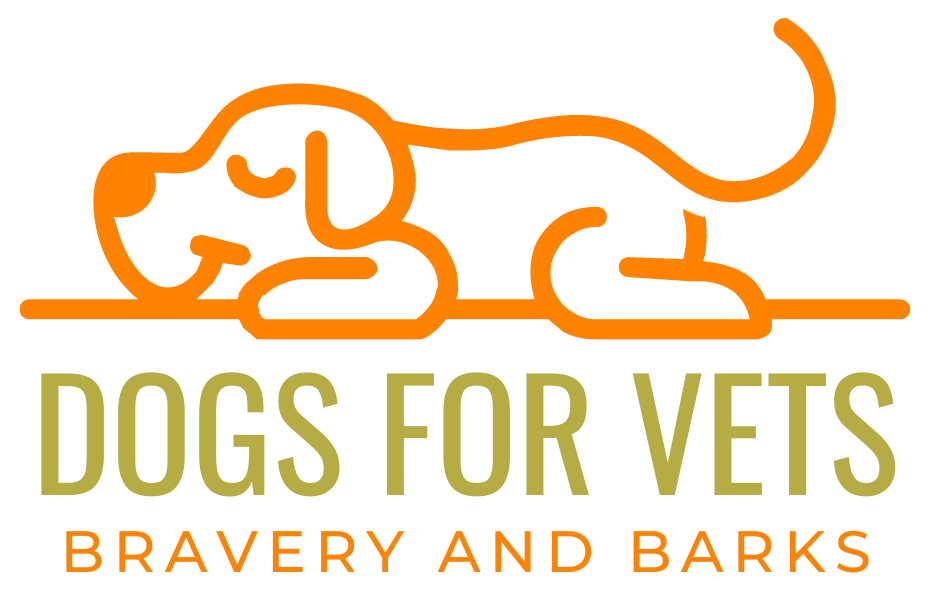This post may contain ads and affiliate links and we may earn a small commission when you click on the links at no additional cost to you. As an Amazon Affiliate, we earn from qualifying purchases. You can read our full disclaimer here.
Can a Goldendoodle Be a Service Dog? Fetching Facts and Insights

Can a Goldendoodle be a service dog? It’s a question that’s been on the minds of many pet enthusiasts and potential service dog handlers, especially with the rise in popularity of this lovable breed.
Goldendoodles, with their curly locks and affable nature, are more than just Instagram-worthy pets. But can they handle the rigorous tasks and responsibilities of being a service dog?
In this deep dive, we’ll explore the potential of Goldendoodles in the world of service dogs, the training involved, and what you need to know if you’re considering this path for your furry friend.
Can a Goldendoodle be a Service Dog? Is it a Match Made in Heaven?

Goldendoodles, a delightful mix of Golden Retrievers and Poodles are known for their intelligence, adaptability, and friendly disposition. These traits often make them ideal candidates for a range of roles—from family pets to potential service companions.
Key Characteristics to Consider:
- Temperament: Naturally affectionate, eager to please, and quick to learn.
- Intelligence: Known for their keen problem-solving abilities and easy trainability.
- Physical Abilities: Energetic and agile, with a sturdy build ideal for various service tasks.
But, as with all breeds, there are considerations and challenges to keep in mind. Every dog is unique, and while breed characteristics can offer guidance, individual assessment and training are paramount.
Can a Goldendoodle Be a Service Dog? Understanding Service Dogs First
Can a Goldendoodle be a service dog? Before we dive into that question, it’s crucial to grasp the history and purpose of service dogs. These loyal companions have been aiding humans for centuries, evolving alongside us to meet our diverse needs.
The Origins and Evolution of Service Dogs
The bond between humans and dogs traces back thousands of years. Initially, dogs assisted with hunting and herding. But as societies developed, so did the roles of our four-legged friends.
By World War I, dogs had roles as messengers and even medics on the battlefield. Over time, this relationship transformed, leading to dogs assisting individuals with disabilities in daily life.
Purpose of Service Dogs Today
In today’s world, service dogs serve a myriad of functions. They:
- Alert deaf individuals to sounds.
- Guide visually impaired people.
- Assist those with mobility challenges.
- Detect medical issues, like seizures or low blood sugar.
Now, let’s demystify some common terms.
Can a Goldendoodle Be a Service Dog, Emotional Support Animal, or Therapy Dog?
Service Dogs
These are specially trained dogs that perform specific tasks for individuals with disabilities. They have legal protections, allowing them access to places like restaurants or airplanes where pets might not typically be allowed.
Emotional Support Animals (ESAs)
While ESAs provide comfort and companionship, they don’t have the specialized training that service dogs do. They’re recognized for their emotional benefits, but they don’t have the same legal protections as service dogs.
Therapy Dogs
These dogs bring joy and comfort to people in settings like hospitals, nursing homes, and schools. They undergo training to handle various environments but don’t perform specific tasks for individuals with disabilities.
Understanding these distinctions is essential. Each type of dog plays a unique role, offering different levels of support and training.
Goldendoodles at a Glance: Can They Be Your Next Service Dog?
Diving into the world of Goldendoodles, we quickly realize the charm and potential of these fluffy companions. Their unique lineage and commendable traits have many asking: are Goldendoodles cut out for service dog work?

The Making of a Goldendoodle
Goldendoodles are a designer breed, an intentional blend of the Golden Retriever’s friendly demeanor and the Poodle’s sharp intellect.
Emerging in the 1990s, they quickly rose in popularity, both for their hypoallergenic coat and their spirited yet gentle nature.
Key Goldendoodle Characteristics
- Appearance: Wavy to curly coat, ranging in colors from golden to chocolate, and sometimes even black.
- Temperament: Affectionate, sociable, and eager to bond with humans.
- Energy Level: Spirited and playful, requiring regular exercise.
- Trainability: Quick learners, often eager to please their handlers.
With such a blend of features, it’s no wonder they’ve won the hearts of many around the world.
Need more Goldendoodle info? Check out these other posts!
Service Dog Potential: Why Goldendoodles Shine
The real question is, how does this translate to service work? Well, here are a few reasons Goldendoodles might just be up to the task:
- Intellect & Adaptability: Drawing from the Poodle’s renowned intelligence, Goldendoodles tend to pick up new commands quickly and can adapt to varied situations.
- Eagerness to Please: Their innate desire to bond and please their humans makes the training process smoother.
- Gentle Demeanor: Essential for service tasks, their natural gentleness ensures they won’t be easily agitated in crowded or unfamiliar settings.
- Hypoallergenic Qualities: For those with allergies, a Goldendoodle’s coat can be a godsend, reducing potential reactions.
While their potential is evident, it’s essential to remember that every dog is an individual. Traits can vary, and the success of a Goldendoodle as a service dog largely depends on consistent training and the specific needs of the handler.
Can a Goldendoodle Be a Service Dog? Decoding the Training Journey
Training a Goldendoodle to become a service dog is no small feat. There are various stages and factors to consider. Let’s unravel the specifics of this process, step by step.
Selection Criteria for Goldendoodles as Service Dogs
Selecting the right Goldendoodle for service training is essential. While many pups might have the initial qualities, specific criteria make some stand out from the rest.
- Age Considerations: Ideally, starting formal training between 6 months to 1 year ensures the pup is young enough to grasp new concepts while being mature enough to handle intensive sessions.
- Health Assessments: A healthy pup is crucial. Regular vet checks ensure they’re fit for the rigors of service work.
- Temperament Insights: A dog’s temperament can make or break its suitability for service roles. The ideal candidate is calm, eager to learn, and interacts well with humans.
Basic Obedience: The Foundations for Goldendoodles
Before venturing into specialized tasks, the basics need to be rock solid. These foundational skills ensure the Goldendoodle is well-behaved and can handle everyday situations.
- Command Mastery: Every service dog starts with the basics: sit, stay, heel, and come.
- Leash Etiquette: Walking without pulling or getting distracted is a must.
- Public Behavior: Polite interactions, like not jumping on strangers, set the tone for advanced training.
Advanced Tasks: Customizing for Service Needs
Once the basics are in place, the real work begins. Training is tailored to the specific requirements of the handler, ensuring the Goldendoodle can provide genuine assistance.
- Guidance Skills: For those visually impaired, the dog learns to guide, stop at curbs, and navigate around obstacles.
- Medical Alerts: Some Goldendoodles are trained to detect and alert for seizures, low blood sugar episodes, or other medical emergencies.
- Mobility Assistance: Tasks might include opening doors, fetching items, or even providing physical balance support.
Training a Goldendoodle to be a service dog is a journey, emphasizing commitment, consistency, and a deep understanding of the handler’s unique needs.
Can a Goldendoodle Be a Service Dog? Exploring the Benefits

Can a Goldendoodle be a service dog? Beyond their undeniable charm and good looks, Goldendoodles bring a range of benefits to the service dog arena. From their unique coat qualities to their adaptable nature, let’s delve into the advantages of choosing a Goldendoodle as a service companion.
Hypoallergenic Coat: A Breath of Fresh Air
One of the standout qualities of Goldendoodles is their hypoallergenic coat. For individuals with allergies, this can be a game-changer.
However, it’s important to note that not all Goldendoodles are hypoallergenic. While many of them inherit the Poodle’s low-shedding coat, it varies from one dog to another.
Always spend time with the dog beforehand if allergies are a concern.
- Less Shedding: Reduced hair fall can mean a cleaner living environment.
- Fewer Allergens: Less hair and dander around may translate to fewer allergic reactions.
- Ease of Maintenance: Their coat often requires regular grooming, but it can be more manageable for those with sensitivities.
Adaptability: Fitting Into Various Lifestyles
Goldendoodles tend to be versatile, making them suitable for various living conditions and climates.
- Adjustment Skills: Whether in an apartment or a house with a yard, they usually adjust well.
- Climate Tolerance: Their coat provides some insulation, making them relatively comfortable in both cooler and warmer conditions.
- Activity Levels: They’re active but not overly so, fitting into both relaxed and energetic lifestyles.
Affection and Eagerness: Building Strong Bonds
At their core, Goldendoodles are affectionate and eager to please. This nature not only endears them to families but also makes them effective service dogs.
- Quick Bonding: Their loving nature often leads to fast connections with handlers.
- Desire to Assist: An inherent eagerness to please translates to dedication in service roles.
- Emotional Support: Beyond physical tasks, their affection provides emotional comfort.
The combination of these benefits showcases why Goldendoodles are gaining popularity in the service dog world. Their multifaceted advantages make them a top choice for many potential handlers.
Can a Goldendoodle Be a Service Dog? Understanding Potential Challenges
While Goldendoodles have numerous benefits as potential service dogs, it’s crucial to be aware of the challenges that might arise.
Just like any breed, Goldendoodles come with their own set of quirks and needs. Addressing these head-on ensures a smooth transition into their role as service companions.

Energy Management: Balancing Play and Work
Goldendoodles, with their blend of Golden Retriever and Poodle genes, can be spirited and energetic. This energy can be both a boon and a challenge.
- Daily Exercise: Ensuring they get adequate physical activity helps in channeling their energy positively.
- Mental Stimulation: Interactive toys and puzzles can keep their active minds occupied.
- Routine: Establishing a regular schedule can help in balancing their work and play times.
Training Consistency: Keeping the Playfulness in Check
Goldendoodles are known for their playful and sometimes mischievous nature. This can sometimes interfere with their training, especially in their younger years.
- Regular Sessions: Consistent training routines help reinforce learned behaviors.
- Positive Reinforcement: Rewarding good behavior ensures they remain motivated.
- Patience: Given their playful demeanor, patience during training sessions is crucial.
Health Considerations: Keeping an Eye Out
As with any breed, Goldendoodles come with certain health predispositions. Being aware of these can ensure timely interventions and a healthier, happier dog.
- Joint Issues: Goldendoodles can sometimes be prone to hip dysplasia. Regular vet check-ups can help in early detection.
- Eye Conditions: Regular eye checks are advisable, as some might develop issues like progressive retinal atrophy.
- Skin Conditions: Their thick coat can sometimes be a breeding ground for fungal or bacterial infections. Regular grooming and check-ups can help prevent this.
In understanding these challenges, potential handlers can be better equipped to decide if a Goldendoodle is the right fit for their service needs and to navigate any hurdles with ease.
Can a Goldendoodle Be a Service Dog? Steps to Ensure Success
Turning your Goldendoodle into a certified service dog requires a structured approach. It’s not just about the innate qualities of the breed, but also about the specific steps and resources you leverage during this transformation. Here’s a comprehensive guide to navigating this journey with your Goldendoodle.
Evaluation: Ensuring the Right Fit
Before anything else, it’s imperative to evaluate whether your Goldendoodle is a suitable candidate for service dog duties.
- Professional Opinion: Consider seeking the advice of a certified dog trainer or behaviorist. They can assess your dog’s temperament, learning ability, and general demeanor.
- Health Check-up: A thorough vet examination can ascertain if your Goldendoodle is free from health issues that might impede service duties.
- Age Consideration: While age isn’t a strict barrier, younger dogs might adapt to training more readily.
Training: Charting the Path
Training is the backbone of turning any dog into a service companion, and Goldendoodles are no exception.
- DIY vs. Professional: While some handlers opt for a DIY approach, leveraging professional training centers can offer structured programs tailored to specific needs.
- Training Resources: Books like “Training Your Own Service Dog” by Lelah Sullivan and “The Ultimate Service Dog Training Manual” by Keagen J. Grace provide valuable insights for those opting for DIY.
- Consistency is Key: Whether going solo or with a professional, consistency in training routines ensures better outcomes.
Certification: Earning the Badge
After training, the certification process is the next crucial step, affirming that your Goldendoodle is ready for service tasks.
- Process & Requirements: Most regions require a demonstration of the dog’s ability to perform specific tasks aiding the handler, along with impeccable public behavior.
- Testing: This often involves real-world scenarios where the dog’s training and behavior are assessed under various conditions.
- Documentation: Once passed, you typically receive a certification document, and in some places, a vest or ID card for the dog.
Legal Protections and Responsibilities
Once certified, your Goldendoodle doesn’t just gain a title; there are legal implications, too.
- Access Rights: A certified service dog generally has the right to accompany their handler in most public places, including restaurants, malls, and on public transport.
- Handler’s Responsibility: It’s crucial to ensure your service dog behaves impeccably in public, avoiding disruptions or issues.
- Awareness: Familiarize yourself with local and national laws regarding service dogs. This can help in situations where your rights are questioned.
By meticulously following these steps and being committed to the process, you can successfully navigate the path of making your Goldendoodle a certified service companion, ready to assist and bring joy to every moment.
Conclusion: The Goldendoodle Service Dog Verdict
Goldendoodles, with their charismatic charm, adaptability, and intelligence, have captured the hearts of many. But the question remains: Can a Goldendoodle be a service dog? The answer, as we’ve explored, is a resounding yes. With the right training, evaluation, and dedication, these fluffy companions can indeed transition into dependable service dogs, ready to assist their handlers in various capacities.
However, as with any journey, there are hurdles to overcome. From ensuring consistent training to understanding the legal nuances, turning your Goldendoodle into a service dog is both a commitment and an adventure. But for those who embark on this path, the rewards – a loyal, trained companion attuned to specific needs – are immeasurable.
As potential handlers or simply as pet enthusiasts, we can all appreciate the versatility and potential of the Goldendoodle. Whether as loving family members or as certified service dogs, they continue to showcase their remarkable ability to adapt, assist, and bring joy to those around them.
-

Coffee Mug – In Dog Coffees I’ve Only Had One
$11.95 – $14.95 Select options This product has multiple variants. The options may be chosen on the product page





